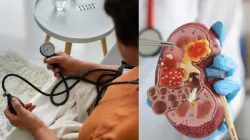Does hypertension affect kidney and heart health? Know causes, symptoms and more
Every person diagnosed with Hypertension should make conscious efforts to prevent the onset of chronic kidney disease by making the necessary lifestyle changes along with proper professional control of the BP.

The force of blood pressing against blood vessel walls when your heart pumps blood is known as blood pressure. An increase in the force that blood exerts on blood vessels during its passage through the body is referred to as high blood pressure or hypertension. It is diagnosed if the BP reading is persistently above 130/80 when checked repeatedly in a health care office. The top value is systolic BP which represents the pressure as the heart beats and pushes blood through the vessels. The bottom value represents the pressure as blood vessels relax between heartbeats.
What are the kidneys and what do they do?
When we spoke to Dr Madhav Sanzgiri, Consultant - Urology, Manipal Hospital, Goa, our kidneys are a pair of organs which function to remove waste products and extra water from our blood circulation regularly by producing urine.
How does high blood pressure affect the kidneys?
High BP can damage the kidneys in several ways including
NARROWING BLOOD VESSELS - It con constrict and narrow blood vessels in the kidneys, reducing blood flow and making it difficult for the kidneys to function properly
DAMAGING FILTERING UNITS - It can harm the tiny blood vessels in the kidneys responsible for filtering blood. Over time, this damage leads to the formation of scars in these filtering units.
CAUSING THE KIDNEYS TO RETAIN FLUID AND SALT - The damaged kidneys are unable to remove excess fluid and waste from the body. This can further increase blood pressure
CREATING A CYCLE OF DAMAGE - The damage caused by high BP results in the body retaining excess salt and fluid which worsens the BP and thus creates a vicious cycle which can lead to kidney failure.
How common is chronic kidney disease (CKD)in patients with high BP?
Approximately 1 in 5 adults with high BP may have chronic kidney disease Hypertension and diabetes are responsible for 40 to 60 percent of CKD cases in India.
What are the symptoms of high BP and CKD?
- Swelling or Edelman in the lower limbs, hands and face
- Loss of appetite, nausea, committing
- Drowsiness and fatigue
- Headaches
- Decreased quantity of urine production
- Itching and dry skin
- Shortness of breath and muscle cramps
How does one diagnose this condition?
- A blood test for checking Glomerular filtration rate (GFR)
- A urine test to check for albumin which is a protein which can pass into the urine due to damaged kidneys
How does one prevent or slow down the progression of CKD from high BP?
- Regular exercise
- Maintaining a healthy body weight (BMI below 25)
- Quit smoking
- Managing stress
- Healthy diet by avoiding extra salt
- Getting enough sleep
Medications
- Angiotensin-converting enzyme (ACE inhibitors
- Angiotensin receptor blockers(ARB)
- Diuretics
How Hypertension Affects Heart Health: Dr Lakshmi Navya, Consultant – Cardiology, Manipal Hospital, Vijayawada, shares insight
- Increased Workload on the Heart: Hypertension constantly raises the blood pressure level, thus putting pressure on the heart to pump blood through more resistance. This added workload leads to hypertrophy of the heart muscles especially the left ventricle of the heart. This, over the years, decreases the efficiency of the heart and may culminate in heart failure.
- Damage to Blood Vessels: Hypertension affects the endothelial layer of the arteries by making them rigid, susceptible to degenerative change, or developing atherosclerosis. This leads to a higher probability of blockages that in turn cause heart attacks and strokes.
- Risk of Coronary Artery Disease: Hypertension prolongs the process of atherosclerosis, which hinders the blood supply to the myocardium. This decreases oxygen supply and may lead to angina or myocardial infarction – heart attack.
- Heart Rhythm Issues: Hypertension can also cause remodelling of the electric system of the heart and hence result in arrhythmias for instance atrial fibrillation. These abnormal heartbeats raise the chances of blood clots and stroke.
- Heart Failure: If left neglected, hypertension affects the heart muscles. This may lead to heart failure, a state in which the heart cannot adequately pump blood as required in the body.
Hypertension control through diet, check-ups, and medications is crucial to maintaining a healthy cardiovascular system in the future. Preventing hypertension at an early stage helps in avoiding more severe cardiovascular events.
ALSO READ: Blood clotting in veins increases by 100 per cent due to pollution, know prevention tips from expert